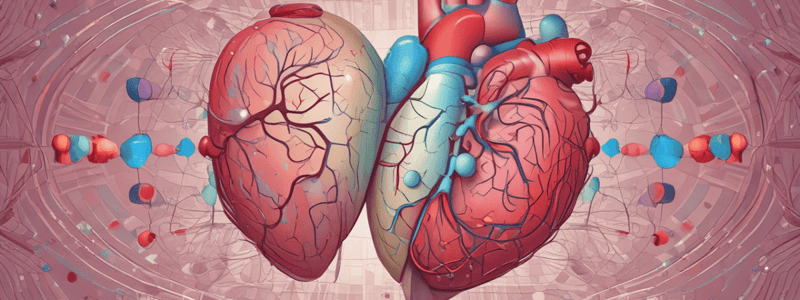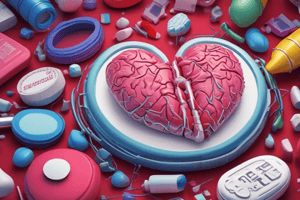Podcast
Questions and Answers
Which of the following is a primary mechanism by which beta-blockers reduce the incidence of angina?
Which of the following is a primary mechanism by which beta-blockers reduce the incidence of angina?
- Decreasing heart rate (correct)
- Increasing afterload
- Increasing blood pressure
- Increasing myocardial contractility
What effect do beta-blockers have on myocardial contractility?
What effect do beta-blockers have on myocardial contractility?
- Decrease contractility (correct)
- Increase contractility
- Increase contractility, but only in specific cases
- No effect on contractility
How do beta-blockers help reduce oxygen demand in the heart?
How do beta-blockers help reduce oxygen demand in the heart?
- By decreasing afterload (correct)
- By increasing heart rate
- By increasing contractility
- By increasing afterload
Which of the following is NOT a mechanism by which beta-blockers reduce the incidence of angina?
Which of the following is NOT a mechanism by which beta-blockers reduce the incidence of angina?
What is the primary reason beta-blockers are considered antihypertensive?
What is the primary reason beta-blockers are considered antihypertensive?
How do beta-blockers affect oxygen supply to the heart?
How do beta-blockers affect oxygen supply to the heart?
Which of the following is a primary benefit of beta-blockers in the treatment of angina?
Which of the following is a primary benefit of beta-blockers in the treatment of angina?
What is the relationship between beta-blockers and afterload in angina treatment?
What is the relationship between beta-blockers and afterload in angina treatment?
Which of the following is a major beta-1 selective antagonist commonly used in the UK for treating angina?
Which of the following is a major beta-1 selective antagonist commonly used in the UK for treating angina?
What is the primary mechanism of action of beta-blockers in treating angina?
What is the primary mechanism of action of beta-blockers in treating angina?
Which of the following statements is TRUE regarding the use of beta-blockers in angina?
Which of the following statements is TRUE regarding the use of beta-blockers in angina?
Which of the following is a primary mechanism of action for calcium channel blockers in the treatment of angina?
Which of the following is a primary mechanism of action for calcium channel blockers in the treatment of angina?
Which of the following statements accurately describes the use of calcium channel blockers in angina?
Which of the following statements accurately describes the use of calcium channel blockers in angina?
Which of the following is NOT a typical effect of beta-blockers on the cardiovascular system?
Which of the following is NOT a typical effect of beta-blockers on the cardiovascular system?
Which type of angina is primarily associated with coronary artery vasospasm?
Which type of angina is primarily associated with coronary artery vasospasm?
What is the main reason beta-blockers are considered effective in the management of angina?
What is the main reason beta-blockers are considered effective in the management of angina?
What is the primary benefit of beta blockers in treating angina pain?
What is the primary benefit of beta blockers in treating angina pain?
How do beta blockers achieve a negative chronotropic effect?
How do beta blockers achieve a negative chronotropic effect?
What happens to myocardial contractility when beta blockers are administered?
What happens to myocardial contractility when beta blockers are administered?
Which mechanism do beta blockers use to lower heart rate during each heartbeat?
Which mechanism do beta blockers use to lower heart rate during each heartbeat?
In the context of heart failure management, what effect do beta blockers have on cardiac conduction?
In the context of heart failure management, what effect do beta blockers have on cardiac conduction?
What physiological change occurs in the myocardium when the heart rate is slowed by beta blockers?
What physiological change occurs in the myocardium when the heart rate is slowed by beta blockers?
Flashcards are hidden until you start studying
Study Notes
Beta Blockers in Angina
- Beta blockers improve oxygen supply to the inner myocardium by slowing the heart rate (negative chronotropic effect) and increasing time for blood perfusion within each heartbeat.
- The major benefit of beta blockers is in relieving angina pain caused by atheroma rather than coronary vasospasm.
Beta-Adrenoceptor Antagonism
- Beta blockers antagonize the effect of the sympathetic nervous system and circulating adrenaline.
- This reduces the activation of cell membrane adenylate cyclase, decreasing cAMP and calcium entry into the cell.
- As a result, heart rate slows, cardiac conduction decreases, and myocardial contractility reduces.
Mechanisms of Beta Blockers in Angina
- Beta blockers reduce oxygen demand by inhibiting myocardial contractility (negative inotrope).
- They reduce oxygen demand by decreasing the afterload on the heart by lowering systemic blood pressure (antihypertensive effect).
- Beta blockers increase oxygen supply to the heart by reducing heart rate, allowing for better distribution of oxygen supply.
Other Beta Blockers
- Propranolol and atenolol are still in common use today.
- Bisoprolol is a major beta1-selective antagonist in use in the UK, with about a 75-fold selectivity for the beta-1 adrenoceptor.
Variant Angina
- Calcium channel blockers are effective in treating variant angina.
- They work by blocking calcium entry into the cell, reducing vasospasm and angina pectoris.
Studying That Suits You
Use AI to generate personalized quizzes and flashcards to suit your learning preferences.




